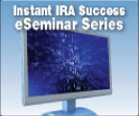 One of the first things you should consider before thinking about selecting a financial advisor is putting together a list of goals you wish to accomplish. This list will provide the basis for establishing your planning objectives.
One of the first things you should consider before thinking about selecting a financial advisor is putting together a list of goals you wish to accomplish. This list will provide the basis for establishing your planning objectives. If you are having a hard time defining your goals, try answering this question: If you were sitting here three years from now and looked back over those three years, what has to have happened during that time for you to feel good about your family wealth transfer plan? This should help you think clearly about what you want to accomplish.
After you develop a list of goals, your next step should be to seek help from a professional financial advisor who can provide you with a prescription for expertly managing your wealth and achieving those goals. The planning process, however, should be a team effort, with specialists from various disciplines working together to provide a coordinated game plan that will help you and your family. Players on your team should include an attorney, accountant, financial planner, money manager, and insurance professional, just to mention a few. Typically, the three leading people among this group are the financial advisor, the attorney, and the accountant.
A qualified planner is one who not only specializes in estate planning but also has demonstrated his or her dedication and commitment to the profession by completing a rigorous course of study on an ongoing basis, and has been tested on many of the family wealth transfer planning concepts.
Having assets in IRAs and qualified plans necessitates use of an advisor who has specialized training in this area. It is important to work with a financial advisor who is aware of the latest IRA distribution and tax rules. Because, let’s face it, if our current economic situation has taught us anything, choosing an educated financial advisor is paramount to keeping your retirement savings safe and secure.
Here are several pertinent questions you should ask your current or prospective financial advisor to determine if they are knowledgeable in this area:
1. I know this area requires specialized knowledge in IRA distribution planning. Do you have expertise in this area? How would I know that?
2. What professional training do you undertake in IRA distribution planning? What courses or programs have you taken? Can you show me the last course manual you received?
3. How do you stay current on key IRA tax laws? What services or resources do you rely on to stay up to date? Can you show me an example?
4. How would you keep track of my beneficiary form? When should I update my IRA beneficiary form? What are the key events that would trigger a need for a review?
5. Do you know what will happen to my IRA after I die? How will you make sure that my beneficiaries will get the stretch IRA?
6. Who do you turn to when you have a question on IRA distribution planning? No one can know it all.
You can visit our website at www.IRAhelp.com to find a qualified advisor who has received extensive training in this area from Ed Slott and Company, and has successfully passed comprehensive exams. Utilize the “Find an Advisor” tab in the middle of the page to search for an advisor in your area.
Remember, working with a financial advisor who fails to stay current with continuing education efforts is, at best, like trying to write with a broken pencil: it’s pointless.
By Marvin Rotenberg and Jared Trexler
------------------------------------------------------------------------------
Comment, Question, Discussion Topic on your mind? Click on the Blue Comment Link below and leave your thoughts then check back to see what other consumers and advisors think.
Also, share this article on Facebook, Twitter, and show us you approve with the Google +1 app under each title.
*Copyright 2011 Ed Slott and Company, LLC






0 comments:
Post a Comment